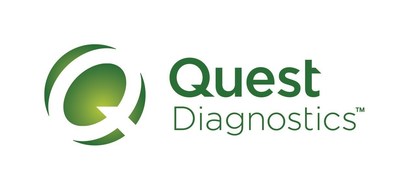SECAUCUS, N.J., June 17, 2019 /PRNewswire/ -- Individuals with prediabetes who participate in an employer-sponsored digital diabetes-prevention counseling program may reduce their risk of developing type 2 diabetes (T2D) for up to eight years, according to a new study from Quest Diagnostics (NYSE: DGX), the world's leading provider of diagnostic information services.

The new study, "Digital Behavioral Counseling in a Workforce Setting Reduces 8-Year Risk of Developing Type 2 Diabetes" (77-LB), is believed to be the first to suggest lower risk of diabetes may be sustained following participation in a time-limited digital Diabetes Prevention Program (DPP). DPPs, which typically consist of education modules on diet and exercise, are recognized by the Centers for Disease Control and Prevention (CDC) as an effective means of reducing risk for type 2 diabetes (T2D).
The study also suggests that the more DPP sessions in which a participant engages online, the greater their improvement on other health markers, including sustained weight loss and lower blood pressure. These data were presented at the American Diabetes Association 79th Scientific Sessions in San Francisco, held June 7-11, 2019.
"Poor health and high healthcare costs increasingly burden employers and employees. While few health concerns are as challenging as diabetes, behavioral change can often slow or prevent the disease if caught in the prediabetes stage," said lead researcher Charles E. Birse, PhD, scientific director, Quest Diagnostics. "Our study is significant because it suggests that robust lab screening coupled with access to digital counseling can help an individual lower risk for a sustained period after the counseling ends. Health promoting strategies such as employer wellness screenings with digital counseling may help reduce risk of chronic diseases, such as diabetes, and the costs associated with those conditions."
The analysis examined de-identified laboratory test results* and other measurements of individuals who participated in an employer-sponsored wellness program for three consecutive years (2016, 2017, and 2018). For inclusion in the study, individuals also had to have hemoglobin A1c or fasting glucose level in the prediabetes range and a Body Mass Index (BMI) equal or greater to 25, a marker of obesity. Individuals also had to complete at least nine lessons of a digital CDC-recognized DPP. Researchers predicted risk of developing diabetes within eight years using a multinomial logistic regression model that assessed yearly trajectories of diabetes risk before and after participation in a digital DPP offered by Omada Health.
At the end of the three-year study, levels for all biometric markers in the 8-year risk T2D model, including for hemoglobin A1c, high-density lipoproteins (HDL, or "good" cholesterol), fasting glucose and triglycerides, had improved across all study cohorts. Diabetes risk decreased relative to the number of digital counseling lessons completed, with the largest decreases in cohorts completing nine or more lessons (cohort average=25.1 lessons). In the year prior to participation in the wellness screening and digital intervention program, T2D risk had increased for all cohorts.
Weight loss has been shown to delay the onset or decrease the risk of T2D.i Sixty-two percent of participants lost weight after the DPP, with 31% losing five percent or more of body weight. Weight loss increased relative to participation in greater numbers of counseling lessons.
More than half of Americans under age 65 — about 158 million people — have health insurance through an employer. According to a 2018 survey of employer-sponsored health plans, average total health benefit cost per employee rose by 3.6% in 2018 on the heels of a 2.6% increase in 2017.ii The American Diabetes Association estimates that almost $90 billion is lost annually in reduced productivity related to diabetes care.iii
In 2018, Quest presented data at the American Diabetes Association Scientific Session showing one-third of participants with prediabetes in an employer-sponsored digital DPP reduced their risk for diabetes. Other research, including a 2015 meta-analysis published in the Mayo Clinic Proceedings, has shown that digital health interventions can improve outcomes for other conditions and measures such as cardiovascular disease, smoking cessation, behavior patterns, physical activity, hemoglobin A1c, blood pressure, and weight loss.
According to the CDC, more than 30 million, or one in 10, Americans have diabetes, and 90% to 95% of them have type 2 diabetes. Another 84 million had prediabetes, but nearly 90% do not know it. Laboratory tests, including hemoglobin A1c and fasting glucose can aid in identifying the condition.
About Quest Diagnostics Health and Wellness
Quest Diagnostics Health & Wellness is a leader in services that improve outcomes and costs for employers and their employees. The company combines data-driven population management strategies based on its proprietary Blueprint for Wellness® laboratory and biometric screening with integrated access to health intervention and behavioral counseling to support employees on the continuum of care to better health. For more information, visit www.QuestForHealth.com.
About Quest Diagnostics
Quest Diagnostics empowers people to take action to improve health outcomes. Derived from the world's largest database of clinical lab results, our diagnostic insights reveal new avenues to identify and treat disease, inspire healthy behaviors and improve health care management. Quest annually serves one in three adult Americans and half the physicians and hospitals in the United States, and our 46,000 employees understand that, in the right hands and with the right context, our diagnostic insights can inspire actions that transform lives. www.QuestDiagnostics.com.
*Quest Diagnostics is committed to data security and privacy, and manages laboratory data in compliance with applicable laws and regulations.
i American Diabetes Association Diabetes Care 2017 Jan; 40(Supplement 1): S44-S47.https://doi.org/10.2337/dc17-S008
ii Mercer. National Survey of Employer-Sponsored Health Plans 2018. https://www.imercer.com/ecommerce/products/employer-sponsored-health-plans. Accessed May 2019
iii American Diabetes Association. The Cost of Diabetes. http://www.diabetes.org/advocacy/news-events/cost-of-diabetes.html. Accessed May 2019
SOURCE Quest Diagnostics
